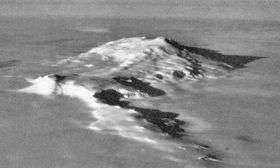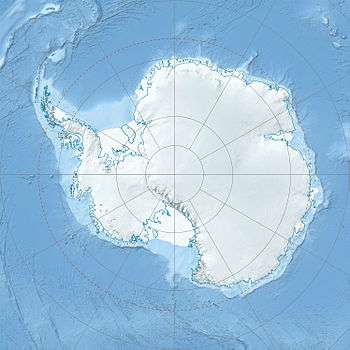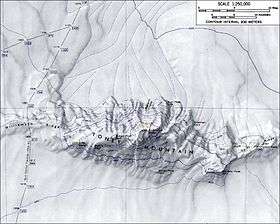Toney Mountain
| Toney Mountain | |
|---|---|
| Richmond Peak | |
 Aerial view of Toney Mountain from the east. | |
| Highest point | |
| Elevation | 3,595 m (11,795 ft) [1] |
| Prominence | 1,946 m (6,385 ft) [1] |
| Listing | Ultra |
| Coordinates | 75°48′S 115°49′W / 75.800°S 115.817°WCoordinates: 75°48′S 115°49′W / 75.800°S 115.817°W [1] |
| Geography | |
 Toney Mountain Antarctica | |
| Location | Marie Byrd Land, Antarctica |
| Geology | |
| Age of rock | Pleistocene to Holocene[2] |
| Mountain type | Shield volcano |
| Last eruption | Unknown |
Toney Mountain is an elongated snow-covered shield volcano, 60 km (38 mi) long and rising to 3,595 m in Richmond Peak, located 56 km (35 mi) SW of Kohler Range in Marie Byrd Land, Antarctica. A 3 km-wide summit caldera tops the volcano and a sample from there yielded a potassium-argon date of 500,000 years ago.[2] Holocene eruptions may have also occurred at Toney Mountain as indicated by 30 kyr ash layers in ice cores from Byrd Station.[2]
Toney Mountain was probably among those viewed from a distance by Admiral Byrd and others of the USAS in plane flights from the ship Bear in February 1940. It was mapped in December 1957 by the oversnow traverse party from Byrd Station to the Sentinel Range, 1957–58, led by C.R. Bentley who proposed the name. Named after George R. Toney, scientific leader at Byrd Station in 1957, a participant in several Antarctic and Arctic operations, serving in both field and administrative capacities.

See also
References
- 1 2 3 "Antarctica Ultra-Prominences" Listed as "Richmond Peak (Toney Mtn.)". Peaklist.org. Retrieved 2012-09-06.
- 1 2 3 "Toney Mountain". Global Volcanism Program. Smithsonian Institution.
- LeMasurier, W. E.; Thomson, J. W., eds. (1990). Volcanoes of the Antarctic Plate and Southern Oceans. American Geophysical Union. p. 512 pp. ISBN 0-87590-172-7.
External links
![]() This article incorporates public domain material from the United States Geological Survey document "Toney Mountain" (content from the Geographic Names Information System).
This article incorporates public domain material from the United States Geological Survey document "Toney Mountain" (content from the Geographic Names Information System).